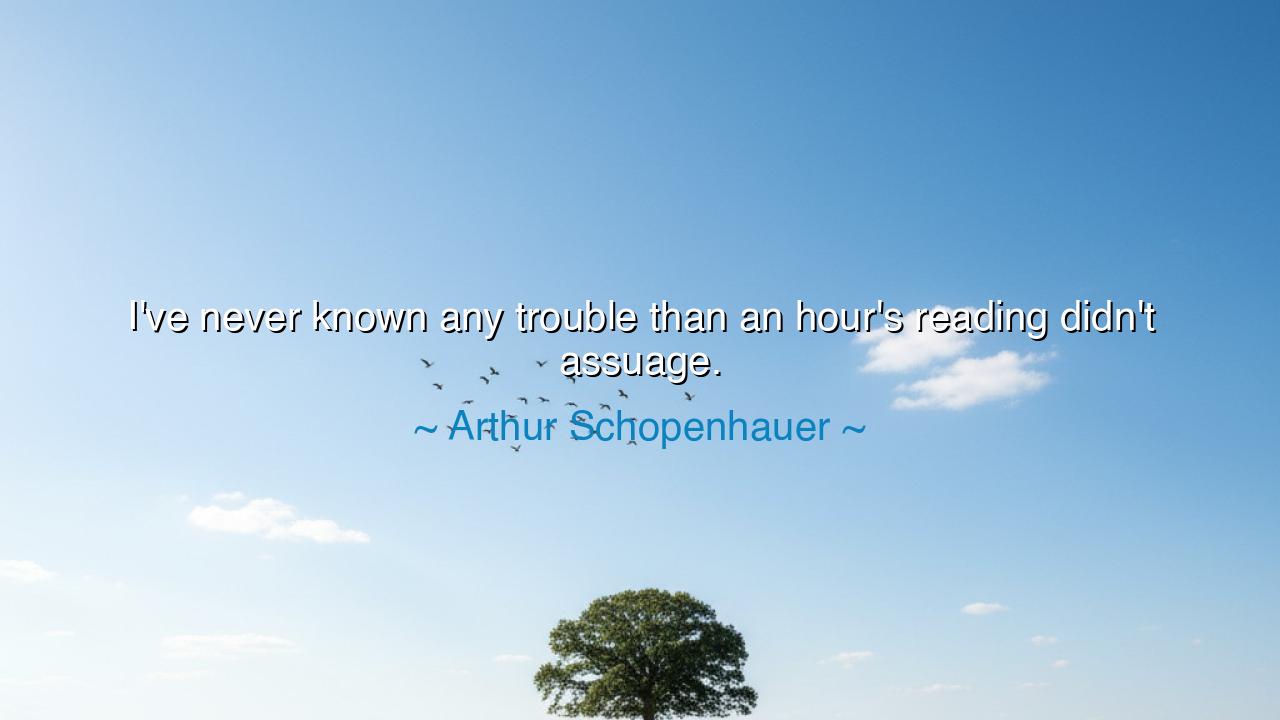
I've never known any trouble than an hour's reading didn't






When Arthur Schopenhauer, the philosopher of solitude and truth, declared, “I’ve never known any trouble than an hour’s reading didn’t assuage,” he was not speaking of escapism, but of healing. In this simple, profound confession lies the testament of a soul that found refuge in wisdom. To read, for Schopenhauer, was to converse with the greatest minds of all time — to walk among the ancients, to sit in the presence of sages, to be reminded that no suffering is unique beneath the sun. His words unveil a timeless remedy: that the mind, when nourished by thought and beauty, can find calm even amid the fiercest storms of the heart.
In his own life, Schopenhauer was no stranger to pain. Misunderstood by his peers, living in the shadow of other philosophers, he often withdrew from society and turned inward. But instead of letting bitterness consume him, he turned to books, to knowledge, to the wisdom of those who had walked before him. Reading became his sanctuary — a spiritual act that cleansed the mind of despair. Each page became a torch against darkness, each idea a ladder lifting him above the noise of daily struggle. To read, he found, was to transcend the prison of the moment.
The ancients would have understood this truth well. When the great Marcus Aurelius, emperor and philosopher, faced war and treachery, he turned to his meditations — words he wrote not for the world, but for his own wounded soul. His writings were, in essence, a form of reading himself back into clarity. Likewise, Seneca, during his exile, found solace in the scrolls of the Stoics, reminding himself that the mind’s peace depends not on circumstance but on understanding. Through the ages, the wise have known that learning is the medicine of sorrow.
There is something divine in the act of reading. When the world wounds you, a book does not argue; it listens and speaks back in calm voices. It opens the heart to the vastness of existence, showing that one’s pain is but a note in the eternal symphony. Whether it be poetry, scripture, philosophy, or the quiet rhythm of a story, reading teaches patience, empathy, and perspective. In turning the page, the mind turns away from self-pity and into reflection. This is why Schopenhauer could say with conviction that an hour’s reading could assuage any trouble — because in that hour, he became larger than his suffering.
History is filled with those who found in books their salvation. Nelson Mandela, imprisoned for twenty-seven years, sustained his spirit by reading and writing — from Shakespeare to poetry. The words he read kept his heart alive in a place designed to break it. Through reading, he communed with the free minds of history even while his body was confined. He proved Schopenhauer’s insight: that the mind, once kindled by wisdom, cannot be chained by despair.
Yet there is also discipline in this comfort. Reading demands stillness, the rarest of virtues in an age of distraction. It requires the humility to listen, to pause, to be taught. It is not a quick balm but a slow purification. When Schopenhauer said that reading soothed his troubles, he was not suggesting that books erase hardship — but that they reshape the soul to bear it with grace. The wisdom we draw from the written word does not remove pain; it transforms it into understanding.
Let this be the lesson: when you are weary, do not rush to noise or numbness. Instead, take up a book — a voice older and wiser than your own — and let it speak to you. Read not to escape, but to return to yourself with new eyes. Let knowledge, beauty, and truth be the quiet companions that heal your unrest. For within an hour of sincere reading, you may not find the end of sorrow, but you will find the beginning of peace.
Thus, the ancient rhythm of learning continues. From Schopenhauer’s lamp-lit solitude to our own restless days, his wisdom endures: that while the body may tire and the heart may ache, the mind — nourished by reading — can still rise above trouble, serene and unconquered. And in that rising, one discovers not only comfort, but the noblest joy of all — the joy of being awakened by thought.






AAdministratorAdministrator
Welcome, honored guests. Please leave a comment, we will respond soon